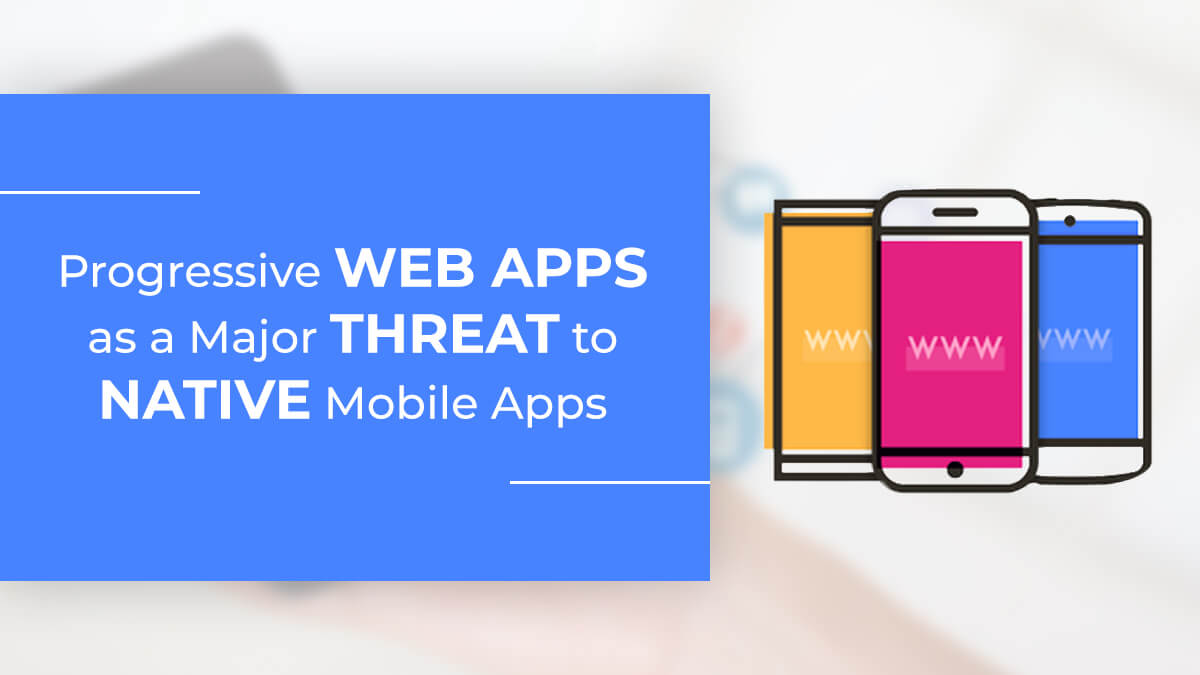Native mobile apps have known to provide the best user experience until now. But how does the future of native app look like under a steadily rising graph of progressive web apps?

Taking into consideration the pros of native as well as hybrid app and eliminated cons of both of them, Mobile App Development as PWA theory managed to attract the attention of both developer community as well as smartphone users.
Inclination Towards Progressive Web Apps (PWA)
To explain in simple words, a progressive web app can be thought of as a website but feels and behaves like a mobile app. PWA allows a user to install apps to a home screen, work offline and even receive push notifications. What empowers PWAs to work offline and function like a mobile app is mentioned in the following pointers:
- Availability of service workers
- Push APIs
- Improved cache
- Browser advancements
Scrutinizing major reasons behind the rising inclination towards PWA, the one that emerges as the strongest is its network independence. Web apps work smoothly despite a weak internet connection. Another overpowering reason to choose a progressive web app over native apps is no storage space required. All smartphone users lack storage space because of already installed apps in their mobile phones that are used in routine lives.
Read More: In-house Team VS Outsourcing
Distinctive Features of Progressive Web Apps
Rightly said that PWA is a perfect blending of web and mobile world, let’s know what differentiates it from native mobile apps and traditional websites
1. Progressive Nature
The best part about PWA is that it works seamlessly across all devices. Being progressive in nature, these apps utilize device and browser features to their advantage.
2. SEO Benefit
A progressive web app is basically a website, which means it is discoverable in search engines. This characteristic of PWA is a major advantage for businesses that are looking forward to expanding their reachability. Native apps lack behind in terms of SEO as they are not visible in major search engines.
3. Easy Installation
PWA can be installed on the user device’s home screen. This feature makes it easily accessible and readily available.
4. Easy Upgradation
Whenever changes are made to PWA with respect to design or content, it is easily reflected in the app.
5. Higher Up Time
PWA is network independent which means that they work perfectly even in areas of poor network connection or even offline modes.
Read more : Things to Keep in Mind Before Choosing a Payment Gateway
Technicalities of PWA that Make it Superior
Service Workers
This is one element that enables web apps to function even offline. The service worker runs in the background by updating content and sending push notifications. Service workers run the script independently of network connection and actively respond to network requests.
These can be described as ‘proxies’ that can handle the event with complete control, allow continuing on the remote server for further operation, and check for cached data. Developers usually implement pre-defined ‘recipes’ for common service workers to enable working in ‘offline mode.
App Shell
This is the basic design model where the mobile web app loads framework or shell at first and later the content and images are loaded. App Shell cannot be described as an API or framework as such, but it is a design approach that optimizes the performance of PWA with advanced caching and service workers.
In this model, the shell of the web app and content is kept completely separate, which ensures it separate caching. This approach is recommended as it ensures the fastest loading of the page the first time and even returns the visit of the user.
On a Concluding Note…
Progressive apps see a bright future in the light of its highlighting features of network independence and easy cum faster access. Businesses are now exploring possibilities on how beneficial it could be for them to develop PWA. Hidden Brains is helping entrepreneurs discover new opportunities in this Mobile Apps Development arena.

